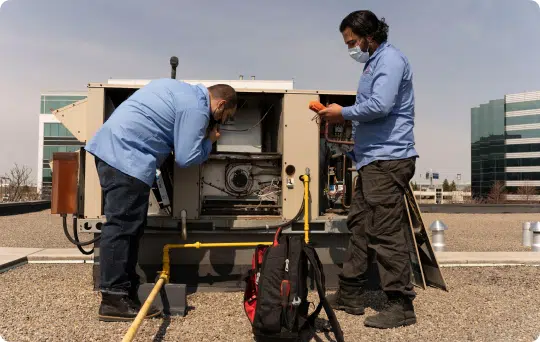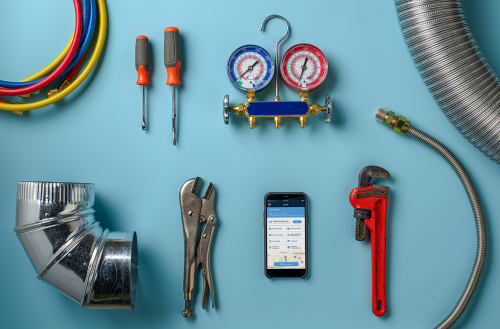Just How to Pick the Right A/c System for Your Requirements
Choosing the appropriate HVAC system is a critical choice that needs cautious consideration of numerous factors. Begin by examining your home's dimension, layout, and distinct needs, as these components dictate the needed ability and arrangement of the system. Furthermore, establishing a budget that incorporates setup and long-term functional costs is important. As you consider your choices, understanding power effectiveness ratings and the ramifications of your local environment will play a substantial function in your choice. The myriad of system types readily available can complicate this process, leading one to ask yourself which path eventually leads to optimal convenience and performance.
Analyze Your Home Size
Analyzing your home dimension is a crucial first step in choosing the proper A/c system. A Cooling and heating system that is also small will struggle to maintain comfy temperature levels, leading to raised power intake and use on the device.
To properly analyze your home dimension, determine the square video footage of each area, thinking about factors such as ceiling height and the layout. Furthermore, take into consideration the insulation high quality and the variety of home windows, as these elements influence thermal efficiency. Houses with open layout might need different system configurations contrasted to those with lots of split spaces.
Utilizing the Guidebook J tons calculation method can give a much more specific quote of your heating and cooling needs. This approach represent various variables, consisting of local environment, solar gain, and occupancy patterns. By carefully reviewing these elements, you can ensure that your picked heating and cooling system is appropriately sized, bring about improved convenience, energy performance, and long life of the devices.
Determine Your Spending Plan
Identifying your budget is an essential action in the cooling and heating system selection procedure, as it sets the specifications for your options - DMAKS HVAC. A cooling and heating system is a considerable financial investment, and understanding your economic limits will aid narrow down options that fit within your means
Begin by examining not just the initial acquisition rate but additionally installation expenses, which can differ significantly depending upon the intricacy of the project. Moreover, take into consideration ongoing costs such as upkeep, repairs, and energy usage. A system may appear economical at first yet can lead to higher costs gradually if it is much less reliable.
It is suggested to allocate a contingency fund for unforeseen costs that may develop throughout installment or first system adjustments (DMAKS HVAC). Additionally, explore financing options or rebates that may be available, as these can relieve the concern of in advance expenses
Eventually, having a clear budget allows you to engage with heating and cooling specialists better, ensuring you get tailored suggestions that straightens with your monetary goals and home needs. By being diligent regarding your budget, you can make enlightened decisions that boost comfort without compromising monetary stability.
Evaluate Power Efficiency
Power efficiency plays a crucial duty in the overall performance and cost-effectiveness of your A/c system. Look for systems with a high Seasonal Power Efficiency Ratio (SEER) for cooling and a high Annual Gas Application Efficiency (AFUE) rating for heating.
Furthermore, take into consideration the Power Celebrity certification, which represents that the system satisfies rigid performance standards established by the Environmental Protection Agency. Purchasing an Energy Star-rated heating and cooling system can cause substantial financial savings with time, specifically in locations with severe temperature level variations.
An additional variable to review is the system's dimension and ability. An extra-large or small device can bring about inadequacy and raised power expenses. DMAKS HVAC. Appropriate sizing, typically figured out with a Hands-on J load calculation, ensures that the system runs at optimum effectiveness


Consider Climate and Atmosphere
When choosing a cooling and heating system, it is crucial to take into consideration the regional Your Domain Name climate and environmental conditions, as these factors significantly affect the system's efficiency and effectiveness. Different regions experience differing temperature extremes, humidity levels, and seasonal adjustments, every one of which influence home heating and cooling down needs.

Furthermore, neighborhood environmental variables, such as air high quality and possible allergens, must inform your option. Systems equipped with sophisticated purification innovations can aid mitigate contaminants and give cleaner air. Additionally, think about the power sources offered in your location-- some HVAC systems are a lot more reliable when powered by natural gas or sustainable power resources.
Ultimately, aligning your a/c system option with your local climate and environmental factors to consider will certainly lead to enhanced comfort, enhanced effectiveness, and reduced power costs.
Explore System Types and Features
As property owners look for to maximize convenience and performance, exploring the various types of heating and cooling systems and their special attributes comes to be essential. The primary sorts of heating and cooling systems include central air, warm pumps, ductless mini-split systems, and heating systems. Each system provides unique advantages tailored to different Go Here needs and preferences.
Central air conditioning systems provide uniform air conditioning throughout a home, making them ideal for bigger rooms. Warmth pumps offer as both home heating and cooling services, using electrical power to transfer heat, which can cause reduced power expenses. Ductless mini-split systems are becoming increasingly preferred as a result of their adaptability and simplicity of installation, allowing homeowners to regulate the temperature level in individual rooms without extensive ductwork.

Verdict
In conclusion, linked here choosing the proper HVAC system necessitates cautious consideration of different variables, consisting of home dimension, budget constraints, energy efficiency, regional climate, and offered system kinds. A detailed assessment of these elements ensures optimal comfort and cost-effectiveness. By following a structured approach, property owners can make informed decisions that align with their specific needs and preferences, inevitably leading to boosted interior air top quality and energy cost savings.